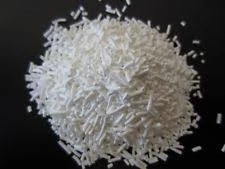
zinc fertilizer
Zinc is an essential micronutrient that plays a pivotal role in plant growth and development. Among various fertilizers, zinc fertilizers are specifically formulated to address the zinc deficiency in soil, enhancing agricultural productivity and ensuring the health of crops. In the context of sustainable agriculture, the importance of zinc fertilizers cannot be overstated, as they contribute to optimal plant nutrition and improved yield quality.
Zinc is critical for several physiological processes in plants. It aids in enzyme function, protein synthesis, and hormone regulation, which are vital for activities such as photosynthesis, cell division, and the formation of chlorophyll. Without adequate zinc, plants may exhibit stunted growth, chlorosis (yellowing of leaves), and poor fruit development. This deficiency not only affects the yield but also diminishes the nutritional quality of the produce, leading to health implications for consumers.
Soil can become depleted of zinc due to various factors, including intensive farming practices, soil erosion, and the use of high-yield crop varieties that may have increased nutrient demands. According to research, zinc deficiency is prevalent in many agricultural regions worldwide, particularly in areas with alkaline soils and low organic matter content. This makes the application of zinc fertilizers a necessary intervention for maintaining soil fertility and ensuring food security.
zinc fertilizer

There are several types of zinc fertilizers available on the market, including zinc sulfate, zinc oxide, and chelated zinc products
. Zinc sulfate is one of the most widely used forms, as it is highly soluble and provides an immediate source of zinc for plants. Chelated zinc, on the other hand, is more stable in the soil and can offer a steady release of this vital nutrient over time, making it a popular choice for long-term soil management.The application of zinc fertilizers can significantly enhance crop yields. Studies have shown that crops such as wheat, rice, and soybeans respond positively to zinc supplementation, often leading to increased productivity and improved grain quality. The economic benefits of using zinc fertilizers are significant, as they contribute to higher returns for farmers and a more stable food supply for communities.
As the global population continues to rise, the challenge of feeding billions while maintaining sustainable agricultural practices becomes increasingly urgent. Zinc fertilizers play a critical role in this landscape by ensuring that crops receive the necessary micronutrients for optimal growth. By addressing zinc deficiency in soils, farmers can enhance crop resilience, improve yields, and ultimately contribute to global food security. Embracing the use of zinc fertilizers is not just an agricultural practice; it is a step towards a more sustainable and nutritious future for all.
-
Pure Sodium Dichloroisocyanurate Dihydrate | Powerful DisinfectantNewsAug.29,2025
-
Industrial Chemicals: Quality & Purity for Every IndustryNewsAug.28,2025
-
Nitrile Rubber Honoring Strict Production StandardsNewsAug.22,2025
-
Aspartame Ingredients Honoring Food Safety ValuesNewsAug.22,2025
-
Fertilizer for Balanced Plant NutritionNewsAug.22,2025
-
Cyanide Gold Processing with High Purity AdditivesNewsAug.22,2025
-
Formic Acid in Textile Dyeing ApplicationsNewsAug.22,2025
Hebei Tenger Chemical Technology Co., Ltd. focuses on the chemical industry and is committed to the export service of chemical raw materials.
-

view more DiethanolisopropanolamineIn the ever-growing field of chemical solutions, diethanolisopropanolamine (DEIPA) stands out as a versatile and important compound. Due to its unique chemical structure and properties, DEIPA is of interest to various industries including construction, personal care, and agriculture. -

view more TriisopropanolamineTriisopropanolamine (TIPA) alkanol amine substance, is a kind of alcohol amine compound with amino and alcohol hydroxyl, and because of its molecules contains both amino and hydroxyl. -

view more Tetramethyl Thiuram DisulfideTetramethyl thiuram disulfide, also known as TMTD, is a white to light-yellow powder with a distinct sulfur-like odor. It is soluble in organic solvents such as benzene, acetone, and ethyl acetate, making it highly versatile for use in different formulations. TMTD is known for its excellent vulcanization acceleration properties, which makes it a key ingredient in the production of rubber products. Additionally, it acts as an effective fungicide and bactericide, making it valuable in agricultural applications. Its high purity and stability ensure consistent performance, making it a preferred choice for manufacturers across various industries.





